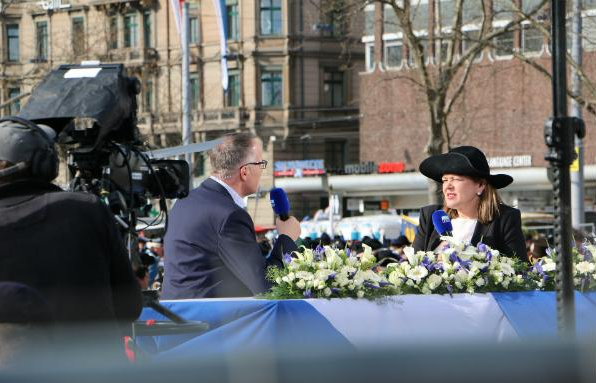
The interrelations between politics and the media are usually quite clear. Almost all the players in this field know their boundaries and amicably survive as long as the boundaries aren’t breached
The media has one undisputed quality: It makes a person well known. If any person regularly appears in the news, reportages, and especially in videos, and says some things (it doesn’t matter what), people begin to recognize him.
This “newsmaker” provides the media’s daily bread: the views, visits, and clicks. This, of course, has long been used by news outlets, which invest in constructing the faces of their brands, so that these then become familiar and ensure profits. Moreover, both the journalist/host and his guest can be the face of the brand — in other words, both the creator and the creation.
This practical model works well in those cases when the media is perceived as a business. When there are competition and financial interests.
Only one-quarter of the media in Armenia, I suppose, is a business; many news outlets are more so appendages — for instance, to a political force, party, or group that has its own financial sources and treats any media that backs it as a distribution platform for its own thoughts and figures.
This is neither good nor bad; it’s just how it is. It’s how it is in countries where competition proceeds not from business, but from politics. Even business proceeds from the interests of the political arena.
News outlets in Armenia are many; political forces that spend their own sources of funding on the media, few. And if any news outlet complains of financial dissatisfaction, it is forced to seek additional funding sources.
Honestly relying on advertising revenue often doesn’t work, since besides the fact that advertising is a derivative of business, and business is a derivative of politics, the advertising market overall is experiencing a decline. The amount of money from advertising is decreasing, and some news outlets are beginning to search for alternative funding sources. And many find them.
Though those sources likewise have a political origin, nevertheless, they differ somewhat. The news outlet begins to provide services. And I’m not just talking about commissioned pieces: these, concealed or undisguised, have always been and will always be around.
Rather, the news outlet is ready to become a tool with the help of which this or that character, this or that reality is constructed. In applying this tool, unknown people become well known (or at least, known); what which is odd or peculiar becomes normal; the unique becomes the everyday.
What and who the media makes well known is important. As a rule, priority is given to civil servants (MPs, staff of the ministerial apparatus, and so on), who by accidental coincidence of circumstances are also businessmen.
Civil servants are Armenia’s chief newsmakers and provide fodder for the media. News outlets first of all provide their services to civil servants.
There was a time when the ranks of MPs or other officials (bureaucrats) were supplemented by cultural or entertainment celebrities. Now it’s the opposite: the bureaucrats themselves are the stars, next to whom the others fade away. Especially since their manner of speaking, vocabulary, and expression of their eyes are so striking and lush that even actors would get jealous.
Let me cite two examples. in recent months, Armenia has been preparing to vote “yes” or “no” to constitutional amendments. Vying for the “yes” vote, two MPs said their part, after which they immediately became stars.
Republican Party of Armenia (HHK) MP Margarit Yesayan asked a partly rhetorical, partly exclamatory question
ARVE Error: The [[arve]] shortcode needs one of this attributes av1mp4, mp4, m4v, webm, ogv, url
in parliament: “Why should Serzh Sargsyan after his officiating go and sit in his house?” [i.e why shouldn’t he contain to remain in power?] The MP was confident that people should not “fear but be proud of” the future possible positions of the current Armenian president.
Another HHK MP, Karine Poghosyan, expressed the idea [AM] that the constitution must be amended regularly and not be allowed to function for 20 years continually. I guess there’s a depreciation period.
These two opinions didn’t satiate the media sector with important information, but only simplified and publicized the images of these civil servants. That is to say, we didn’t understand why we can’t be proud of a Serzh Sargsyan who sits in his house and when the constitution expires.
But we understood and recognized the authors of these remarks.
The interrelations between politics and the media are usually quite clear. Almost all the players in this field know their boundaries and amicably survive as long as the boundaries aren’t breached. And if the main political force needs to engage in preaching (to prompt to say “yes”), the audience doesn’t follow the preaching as much as the preacher.
And this is how optimism sometimes begins.
Many news outlets provide their services to the main political force and make the large and small “preaching bricks” that it owns well known. With this move, news outlets not only solve the problem of survival, but also help us to reconsider the suitability of the construction built with those bricks.
Of course if a lot is said and shown about something, the audience acclimatizes. Even if that which is shown is tasteless, uninteresting, ridiculous, and even harmful.
But acclimatization also has its boundaries. And service has its end.
Nune Hakhverdyan
The views expressed in the column are those of the author's and do not necessarily reflect the views of Media.am.


Add new comment
Comments by Media.am readers become public after moderation. We urge our readers not to leave anonymous comments. It’s always nice to know with whom one is speaking.
We do not publish comments that contain profanities, non-normative lexicon, personal attacks or threats. We do not publish comments that spread hate.